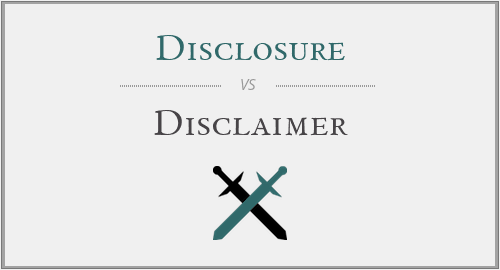Disclosure vs Disclaimer: A Linguistic Exploration
Etymology and Background
The terms "disclosure" and "disclaimer" both have roots in Latin, but their paths diverge in usage and meaning. "Disclosure" comes from the Latin word "disclosus," which means "to open up" or "uncover." It entered the English language through Old French "desclos," maintaining the sense of revealing or making known.
On the other hand, "disclaimer" is derived from the Old French word "desclamer," which means "to renounce." Its Latin roots lie in "disclamare," which translates to "to cry out against." This etymology reflects its current use as a statement that denies responsibility or affiliation.
Usage and Context
Both terms are commonly used in legal, business, and everyday contexts, but they serve distinct functions.
Disclosure
Disclosure refers to the act of making information known, often in a context where transparency is required or beneficial. It is typically used in legal, financial, and corporate settings.
- "The company’s annual report included a full disclosure of its financial performance."
- "She made a disclosure about her conflicts of interest before joining the board."
- "The law mandates the disclosure of all relevant evidence in a criminal trial."
Disclaimer
A disclaimer is a statement that denies responsibility or affiliation, often used to limit liability. It is frequently found in legal documents, websites, and various forms of media.

- "The book included a disclaimer stating that the views expressed were solely those of the author."
- "The website’s disclaimer notes that it is not responsible for the content of external links."
- "The doctor provided a disclaimer about the limitations and potential risks of the treatment."
Modern Connotations and Impact
In modern usage, disclosures are often associated with transparency and honesty. They are seen as essential for maintaining trust in professional and public domains. Disclosures can be voluntary or mandated by law to ensure that all relevant information is available for decision-making processes.
Disclaimers, however, are primarily used as protective measures. They are designed to preemptively address potential legal issues by clarifying boundaries and responsibilities. This can help organizations and individuals avoid litigation and manage expectations.
Conclusion
In summary, while both disclosure and disclaimer involve the communication of information, they serve distinct purposes. Disclosure is about revealing information transparently, often to ensure accountability and trust. Disclaimer, conversely, is about limiting responsibility and protecting against potential legal claims. Understanding the nuanced differences between these terms is crucial in contexts where precise communication is necessary.








Have a discussion about this article with the community:
Report Comment
We're doing our best to make sure our content is useful, accurate and safe.
If by any chance you spot an inappropriate comment while navigating through our website please use this form to let us know, and we'll take care of it shortly.
Attachment
You need to be logged in to favorite.
Log In